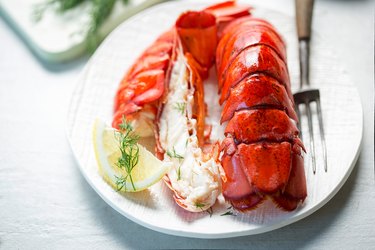
Not many foods can compare to the decadence of a freshly prepared lobster dipped in butter. But unless you live on the coast, finding fresh lobster at your supermarket can be difficult.
Whether or not you live in a land-locked state, frozen lobster can be just as delicious.
Video of the Day
Video of the Day
Frozen lobster is a cost-effective way to enjoy a delicacy and, in some cases, it can even be fresher than raw or live seafood, says Chef Nik Fields, founder of Chic Chef Co. Generally, there's no big taste difference between fresh or frozen lobster — in fact, the taste boils down to how you prepare it.
Here, celebrity chef Serena Poon shares what you'll need and the steps to follow to cook a frozen whole lobster for a luxurious dinner any night of the week.
How to Prepare Frozen Whole Lobster
Things You'll Need
Frozen whole lobster
Large stockpot
Himalayan sea salt
Water
Tongs
Butter
Garlic
Celery salt
Lemon zest
Fresh herbs like thyme, dill or basil
Step 1: Choose the Right Kind of Lobster
The process of cooking lobster begins at the supermarket. Your choice can make a noticeable difference in the final result, so choose wisely.
"The lobster you choose will greatly impact how your dish tastes," Poon says. "Choose frozen cold water lobster (like from Maine) for the best flavor and texture. If you can, select lobster from a quality purveyor that has been flash frozen. It's also important to avoid gray or brown spots on the tail for freshness."
Step 2: Thaw Your Frozen Lobster
Your lobster must be properly thawed before cooking it.
To thaw frozen lobster, place it in the refrigerator for about 24 hours before you need to cook it.
For those in a time crunch, Poon recommends placing the lobster in a sealed bag in a large glass bowl and running it under cold water in the sink for about 30 minutes.
Warning
When you're thawing lobster in cold water, make sure to never let the water get warm — and don't use hot water to thaw frozen food, per the USDA. Doing so can increase your risk of getting foodborne illness.
Also, cook the lobster immediately after it’s fully thawed.
Step 3: Boil the Lobster
There are many ways to cook whole lobsters. One of the most common and easiest methods is boiling them, which is what Poon recommends.
For this cooking method, you'll need a large stockpot filled with water about 2/3 of the way full. Add 1/4 cup of Himalayan sea salt, and bring the water to a boil.
Once the water is boiling, add the lobster. Allow the water to return to a boil before turning the heat down slightly. The water should still be bubbling.
Boil a 1-pound lobster for about 10 minutes. If the lobster is larger or you're cooking more than one, add a few more minutes.
You'll know when the lobster is done cooking by the color of the shell and meat as well as the internal temperature. Poon says the lobster shells will be bright red and the inside meat will be white. Using a food thermometer, make sure the internal temperature reaches 145 degrees Fahrenheit when cooked, according to the FDA.
When the lobster is done cooking, carefully remove it from the pot with a pair of tongs.
Step 4: Season and Serve
The best part of cooking lobster is enjoying it once it's done. One pound of lobster yields about a 1/3 pound of cooked meat, according to California Sea Grant.
To add flavor to the lobster, Poon recommends serving with melted garlic-herb butter: Make it at home by melting butter and combining it with garlic, celery salt, lemon zest and fresh finely chopped herbs like thyme, dill or basil.
Poon recommends butterflying the lobster tail, which means cutting down the middle to reveal the meat inside. Drizzle it with the melted butter sauce. Serve with a side of melted butter to dip the claw and body meat into.
How to Serve Lobster
Serving your lobster with the perfect sides will take your dinner to the next level.
While you can certainly serve lobster with butter or ghee on the side, Fields recommends that you sprinkle the meat with some citrus, like lemon, to add to the overall flavor. Plus, this will add some vitamin C to your meal.
Lobster is an excellent source of lean protein, Fields says. But you still want to include some veggies and carbs for a more balanced meal. Consider adding some leafy greens or cruciferous veggies to increase the amount of fiber in your dinner. This crucial nutrient can help keep your blood sugar levels and digestive health regular.
To add some more density to your dinner, consider preparing some brown rice or buckwheat. These whole grains are both nutritious and satisfying.